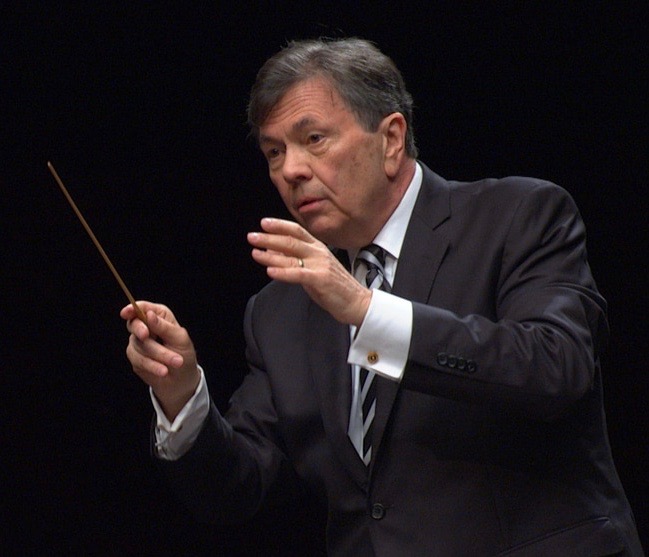Schwarz, Frost Symphony bring heroic swagger to Strauss’s “Heldenleben”
In his first season as music director of the Frost Symphony Orchestra, Gerard Schwarz has already been producing huge strides in the performance level of the student ensemble. On Thursday at UM Gusman Concert Hall, Schwarz led the players in a strong reading of a Strauss orchestral showpiece.
Associate conductor Gregory Cardi opened the evening with Piston’s Toccata. The brash 1948 work is not one of the New England composer’s strongest efforts but it resounds in his distinctively American voice. Cardi adeptly captured the score’s brassy, festive aura while bringing needed contrast to the pensive central episode.
Unfortunately, the originally announced Three New England Sketches by Walter Piston—one of that American composer’s finest works—was jettisoned in favor of a hodgepodge of concerto movements with a group of student soloists.
Claire Geho, a student oft Charles Castleman, soloed in the opening Allegro of Tchaikovsky’s Violin Concerto in D Major. Geho initially seemed nervous, displaying some intonation problems, particularly in the expansive secondary theme. She gradually gained security, her rubato and tonal sheen were well attuned to the romantic aura of Tchaikovsky’s discourse. She clearly had practiced the cadenza well and dispatched it with precision and showmanship. Still one could not help thinking that Geho’s talents would have been better showcased in Bach or Mozart works. Schwarz gave her strong support, drawing particularly fine playing from the strings.
The final Movida movement from the Concerto for Alto Saxophone (1954) by Radames Gnattali is an engaging mix of Ibert-tinged sophistication with jazz rhythms. Joey Speranzo, a winner of the Frost concerto competition, produced a big, rich sound from the instrument with an appealing vibrato. Whether playing at rapid speed or spinning melodic phrases, his smooth technique and idiomatic command were strongly in evidence. Long a contemporary music specialist, Schwarz brought clarity and definition to the orchestral lines and captured the essence of Gnattali’s musical gumbo.
Rachmaninoff’s Piano Concerto No. 1 in F-sharp minor requires sweeping big-boned virtuosity and interpretive depth. Despite an earnest effort, Shih Man Weng was less than equal to the first movement Vivace. Playing at a high volume could not compensate for choppy phrasing of the big melodies or smudged runs but she did project some of the movement’s fiery drive in this small-scale rendition. Schwarz’s patrician molding of thematic episodes and affinity for Rachmaninoff’s brand of heated instrumental rhetoric was more on target.
Following intermission, Strauss’s massive tone poem Ein Heldenleben (A Hero’s Life) proved a testament to the impressive strides Schwarz has made in a short time with these young musicians. While the Frost players are not quite on a New World Symphony level, they came remarkably close. With the entire orchestra playing at white heat, Schwarz led an exciting performance in terms of both ensemble sonority and Straussian grandeur. This score is too large for the size and live acoustic of Gusman Hall and climaxes turned overpowering but Schwarz’s transparent detailing made every instrumental voice distinct.
With divided first and second violins on opposite sides of the podium, ten double basses at stage left, a large brass contingent on the far right and percussion divided across the back, the blazing thunder and Viennese warmth of Strauss’ self portrait came through. The winds chirped gleefully as the hero’s enemies (music critics) and trumpets from the lobby crisply articulated the call to battle.
When the theme from Strauss’ Don Juan blared forth from the horns, their spot-on, rounded sound glowed. The moments of nostalgia with quotes from other Strauss works emerged in broad strokes. There was a sense of calm benediction and eloquence in Schwarz’s shaping of the final pages depicting the hero’s retirement from the world. Among strong playing from all sections, concertmaster Rosie Weiss’s stellar solos were almost concerto-like. Her plush tone and mastery of intricacies were consistently impressive. Under her leadership, the violins really soared in the return of the hero’s theme midway through the fifty minute essay.
Clearly there is a real rapport between conductor and musicians. Schwarz applauded his players and gave them a thumbs up as he acknowledged first chair members and entire sections during curtain calls.
Gerard Schwarz conducts the Frost Symphony Orchestra in Haydn’s Symphony No. 22 (“The Philosopher”), Beethoven’s Symphony No. 6 and Mozart’s Sinfonia Concertante for violin and viola with soloists Scott Flavin and Jodi Levitz 7:30 p.m. March 4 at UM Gusman Concert Hall. frostmusiclive.com
Posted in Performances
Leave a Comment
Fri Feb 7, 2020
at 12:40 pm
No Comments







